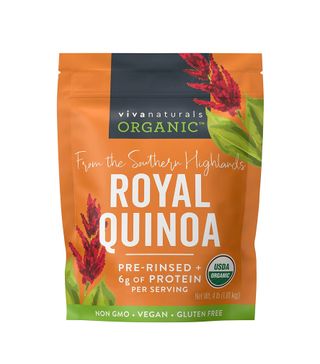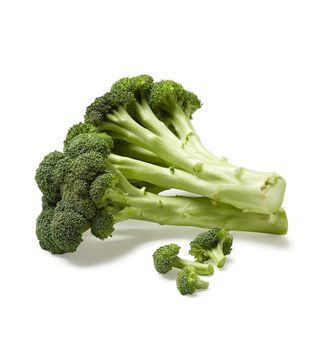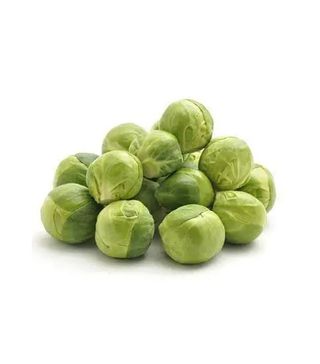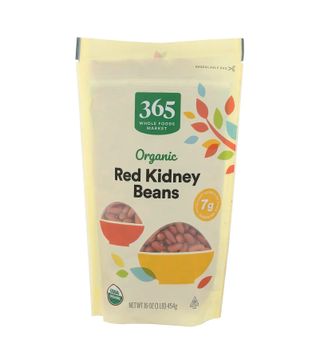Avoid These 10 Foods If You Have PCOS

For many women, figuring out how to manage and treat the symptoms of PCOS is an ongoing, challenging process. And you might be surprised to find out that more women are dealing with it than you think. According to the Office on Women's Health, polycystic ovary syndrome affects one in 10 women of childbearing age, with many women finding out they have it in their 20s and 30s, but it can happen at any age after puberty. It's caused by an imbalance of reproductive hormones, which in turn could create problems in the ovaries, and the egg that is released each month during ovulation "may not develop as it should or it may not be released during ovulation as it should be."
Some symptoms of PCOS include an irregular menstrual cycle, extra hair growth (on the face or chin), acne, thinning head hair, weight gain, darkening of the skin, and skin tags. It might also make getting pregnant difficult. Obesity and hereditary factors could up your risk of PCOS. There is no known cause, but many experts believe high levels of androgen (the male sex hormone) and insulin might be a factor.

While there is no cure for PCOS, there are ways to combat the symptoms. "Because we do not know the cause of PCOS, we treat its symptoms, such as giving patients birth control pills to regulate the cycle; recommending weight loss because losing weight can make the menstrual cycle more regular; diabetes pills for women with pre-diabetes and diabetes; and hirsutism pills for extra hair," says Zaher Merhi, MD, FACOG, HCLD.
Managing stress is another way to control symptoms—but we know that "trying to relax" is easier said than done. "Stress can increase levels of cortisol or the 'stress hormone.' Chronically elevated cortisol can wreak havoc on our hormones and increase inflammation. Practice yoga, meditate, spend time with friends and family—do whatever you need to do to lessen anxiety and stress in your life," says Sarah Rueven, RD, MS, CDN, founder of Rooted Wellness. Getting enough sleep is important to treating symptoms, too.
But healthy eating can play a big role when dealing with PCOS. "If overweight, even a modest reduction in weight can help improve symptoms. Eating a well-balanced diet made up primarily of real, whole foods is an effective strategy for weight loss. Getting regular exercise can also help not only with weight loss but with reducing inflammation and insulin resistance," adds Rueven.
So what exactly should you eat and avoid if you have PCOS? We asked the experts. But keep in mind that you'll want to consult your doctor to come up with a treatment that's right for you.
Foods to Avoid
1. Sugary Treats

"Women with PCOS should avoid insulin-spiking and inflammatory foods, as these will contribute to both imbalance in blood sugar levels, insulin, and disrupt gut health," says Alisa Vitti, HHC, AADP, founder of Flo Living. This includes sweets like cookies and candy and other foods that have added sugars. Look at nutritional labels to help you choose.
2. Caffeine

Vitti also recommends staying away from coffee and other caffeinated drinks, as they can disrupt the balance, too.
3. Alcohol

Those cocktails or glasses of wine might mess with your PCOS symptoms. Consuming too much alcohol can cause more inflammation.
4. Processed Carbs

"You will see huge benefits by avoiding processed carbohydrates like white bread, white rice, pasta, soda, candy, and baked goods," Rueven says. "These foods are stripped of their fiber and therefore have the biggest impact on blood sugar levels. Regularly eating these foods can worsen insulin resistance, which will exacerbate PCOS symptoms." But that doesn't mean you have to avoid carbs altogether. We'll get to what that means later on.
5. Processed Meats

Hot dogs, sausages, pepperoni—these are inflammatory foods that you might want to limit, too.
6. Processed Snacks

Are you sensing a theme here? And if you're thinking eating whole foods might be the key to dealing with PCOS, you're on the money. Merhi suggests replacing potato and tortilla chips with crackers and popcorn (but be sure to read the labels first).
7. Fried Foods

It was nice knowing you, French fries. They—along with other deep-fried indulgences like fried chicken and corn dogs—are inflammatory.
8. Dairy

While there is limited information on the effects of dairy on PCOS symptoms—studies were either self-reported or done on a small group—it might be worth limiting your dairy intake.
9. Sodas and Juices

Both of these have so much added sugar, which can cause your insulin levels to spike. Merhi suggests avoiding sweetened juices and opting for fresh fruit juices with no sugar added and no sweeteners. He also says instead of soda and juices, reach for water and seltzer. And now that there are so many delicious seltzer options out there, it might not be so hard to quit (fingers crossed).
10. Starchy Vegetables
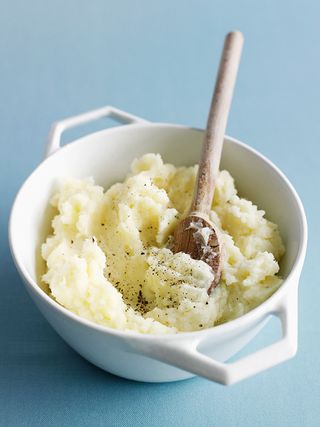
Not all veggies are created equally. "Avoid vegetables with a lot of starch, such as potatoes and corn, and eat green ones such as broccoli and spinach," Merhi says.
Foods to Eat
And now that we've given you a big list of foods that you might want to consider reducing, or cutting out altogether, we thought it'd only be right to tell you about the stuff you should load up on, according to the experts.
1. High-Quality Carbs

Remember when we said we'd talk more about carbs later? Carbs have the biggest influence on insulin levels, Rueven says, so it's important to be mindful of what carbs you're eating. "High-quality or complex carbohydrates are those that are minimally processed and high in fiber, like whole-wheat bread, brown rice, quinoa, farro, and legumes (think beans, chickpeas, and lentils). The fiber in these foods slows digestion and lessens the impact on blood sugar levels," she says. "In comparison, highly processed carbohydrates (like white bread, pasta, soda, candy, baked goods, etc.) are lacking in fiber and cause drastic spikes and drops in blood sugar, which worsens insulin resistance."
Don't be afraid of carbs, especially the "good" ones. Rueven recommends pairing complex carbs with a protein or healthy fat to curb the body's blood sugar response.
2. High-Fiber Plants
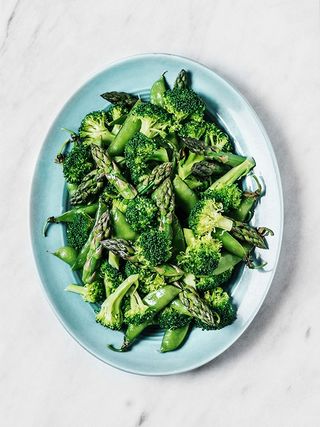
Vitti suggests adding veggies that are high in fiber to the mix to help symptoms. Think broccoli, brussels sprouts, and peas.
3. Lean Proteins
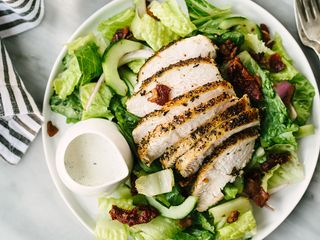
Your body needs protein, so opt for lean meats, Vitti suggests. And if you're a vegetarian, you can get plenty of lean protein from plant sources like beans.
4. Omega-3 Fatty Acids

These are always good to have in your diet. "Omega-3 fatty acids also have powerful anti-inflammatory properties. Sources of omega-3s include fatty fish (like salmon, mackerel, and tuna) and nuts and seeds (like chia seeds, flaxseeds, and walnuts)," Rueven says.
5. Colorful Veggies

In addition to the greens we mentioned above, look for brightly colored veggies like red peppers and orange sweet potatoes. "Antioxidants work in our bodies to quench inflammation-causing free radicals. To ensure you are getting all of the benefits of antioxidants, aim to eat five to 10 servings of fruits and veggies each day in a variety of different colors," says Rueven.
Next, Avoid These 6 Foods—They'll Wreck Your Gut Health
This article was originally published at an earlier date and has been updated.
Disclaimer
This article is provided for informational purposes only and is not intended to be used in the place of advice of your physician or other medical professionals. You should always consult with your doctor or healthcare provider first with any health-related questions.
Sarah is lifestyle writer and editor with over 10 years of experience covering health and wellness, interior design, food, beauty, and tech. Born and raised in Los Angeles, she attended New York University and lived in New York for 12 years before returning to L.A. in 2019.
In addition to her work on THE/THIRTY and Who What Wear, she held editor roles at Apartment Therapy, Real Simple, House Beautiful, Elle Decor, and The Bump (sister site of The Knot).
She has a passion for health and wellness, but she especially loves writing about mental health. Her self-care routine consists of five things: a good workout, “me” time on the regular, an intriguing book/podcast/playlist to unwind after a long day, naps, and decorating her home.
-
 I Only Ate Sakara Life Meals for 30 Days—Here Are 7 Things That Happened
I Only Ate Sakara Life Meals for 30 Days—Here Are 7 Things That HappenedThe brand's 30-Day Fall Reset is finally here.
By Erin Jahns
-
 The 6 Warning Signs You're Not Getting Enough Protein
The 6 Warning Signs You're Not Getting Enough ProteinAnd what to eat to up your intake.
By Sarah Yang
-
 Everything This Professional Ballet Dancer Eats to Fuel Her For Performances
Everything This Professional Ballet Dancer Eats to Fuel Her For PerformancesHer grocery staples include high-quality French butter.
By Candice Aman
-
 These 8 Foods Are the Worst for Rosacea—Here's What to Eat Instead
These 8 Foods Are the Worst for Rosacea—Here's What to Eat InsteadControl those flare-ups.
By Sarah Yang
-
 15 Things That Cause Bloating and How to Get Rid of It ASAP
15 Things That Cause Bloating and How to Get Rid of It ASAPTry these.
By Sarah Yang
-
 Is the Alkaline Diet Overhyped? What Experts Want You to Know
Is the Alkaline Diet Overhyped? What Experts Want You to KnowHere's how it works.
By Sarah Yang
-
 I'm an Imperfect Dietitian and My Key to Eating Healthy Meals Is Convenience
I'm an Imperfect Dietitian and My Key to Eating Healthy Meals Is ConvenienceTake a peek at my weekly grocery staples.
By Candice Aman
-
 Avoid These 6 Foods—They'll Wreck Your Gut Health
Avoid These 6 Foods—They'll Wreck Your Gut HealthWhat to eat instead.
By Sarah Yang
